Yumi Yamamoto, a longevity researcher, listed four secrets from Japan's longest-lived people, such as eating until 80% full or keeping your back straight.
Yumi Yamamoto, research director of LongeviQuest, an organization that verifies the ages of the world's oldest people and collects information about them, said the organization has verified four supercentenarians this year who live over 110, according to a December 5 Business Insider post. Among them is Fusa Tatsumi, who celebrated her 116th birthday in the spring and is Japan's oldest person.
LongeviQuest has identified 269 people over 110 in Japan, many of whom live in Okinawa, one of the so-called Blue Zones where the number of centenarians is unusually high.
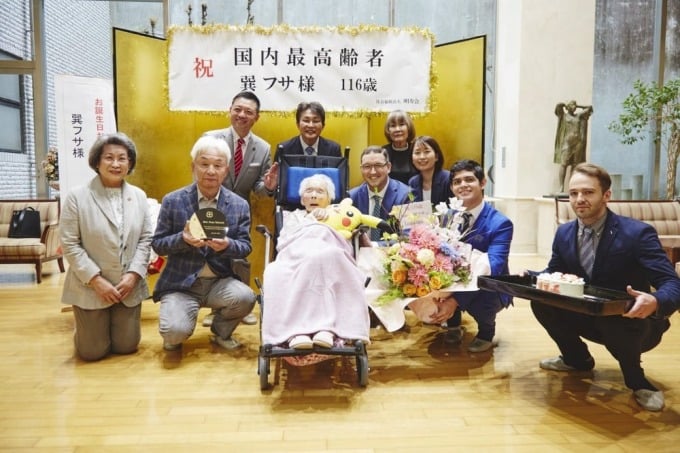
Yumi Yamamoto, third from right, and members of LongeviQuest celebrate the birthday of 116-year-old Fusa Tatsumi (center) earlier this year. Photo: LongeviQuest
Like other Blue Zones, long-lived people in Japan tend to eat less meat and spend more time with family. But they have other more specific habits than some countries, according to Yamamoto.
"There is a Japanese saying that you should only eat until you are 80% full, leaving room for the end of the meal," said Yamamoto, the great-granddaughter of Shigeyo Nakachi, who was the second oldest person in Japan when she died in 2021 at the age of 115.
According to animal studies, this habit helps Japanese people be conscious of their diet, limits calories, reduces inflammation and is beneficial for longevity.
The average daily calorie intake for a person in the Okinawa Blue Zone is only about 1,900, lower than the 2,000 calories recommended by the US Food and Drug Administration.
One of the biggest lessons Yamamoto learned from talking to long-lived people was "don't do anything in excess, do everything in moderation ."
Kane Tanaka, the oldest Japanese person in history, lived to be 119 and loved Coca-Cola but only drank one bottle a day.
"He's not an addict, nor does he drink too much. This is common in Japan. Japanese people eat a balanced diet and don't overeat," Yamamoto said. "That applies not only to food but also to lifestyle habits like staying up late."
Experts agree that snacking in moderation can help make healthy eating more sustainable. This approach is called the 80/20 rule (eating healthy 80% of the time and being more flexible in the remaining 20%).
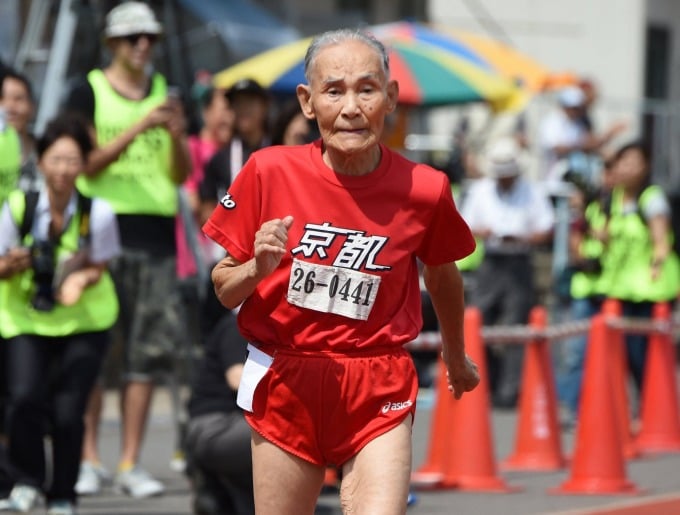
Hidekichi Miyazak, 105, runs 100 meters in Tokyo in 2015. Photo: AFP
Yamamoto said that in Japan, people often do radio exercises . Since 1928, a radio program has been instructing listeners on 5-minute exercises every day. Yamamoto tries to do radio exercises every morning like the long-lived people in Japan.
Many studies show that short periods of high-intensity physical activity reduce the risk of cancer and heart disease, thereby improving longevity.
Most Blue Zone long-lived people do not go to the gym but incorporate exercise into their daily lives, such as walking, climbing stairs, or playing group sports to socialize and exercise.
Yamamoto says body posture is also important. Her great-grandmother always kept her back straight . "I noticed that centenarians and centenarians in Japan always kept their backs straight, very disciplined and strict with themselves," she says. "As humans, we tend to hunch over a little as we get older, but Japanese seniors always keep their backs straight."
Research shows that good posture keeps the body comfortable, prevents pain, and helps functions function properly.
Hong Hanh (According to Business Insider )
Source link


![[Photo] Solemn opening of the 12th Military Party Congress for the 2025-2030 term](https://vphoto.vietnam.vn/thumb/1200x675/vietnam/resource/IMAGE/2025/9/30/2cd383b3130d41a1a4b5ace0d5eb989d)

![[Photo] President Luong Cuong receives President of the Cuban National Assembly Esteban Lazo Hernandez](https://vphoto.vietnam.vn/thumb/1200x675/vietnam/resource/IMAGE/2025/9/30/4d38932911c24f6ea1936252bd5427fa)
![[Photo] General Secretary To Lam, Secretary of the Central Military Commission attends the 12th Party Congress of the Army](https://vphoto.vietnam.vn/thumb/1200x675/vietnam/resource/IMAGE/2025/9/30/9b63aaa37ddb472ead84e3870a8ae825)
![[Photo] Panorama of the cable-stayed bridge, the final bottleneck of the Ben Luc-Long Thanh expressway](https://vphoto.vietnam.vn/thumb/1200x675/vietnam/resource/IMAGE/2025/9/30/391fdf21025541d6b2f092e49a17243f)
![[Photo] The 1st Congress of Phu Tho Provincial Party Committee, term 2025-2030](https://vphoto.vietnam.vn/thumb/1200x675/vietnam/resource/IMAGE/2025/9/30/1507da06216649bba8a1ce6251816820)
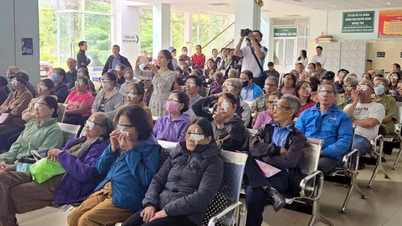

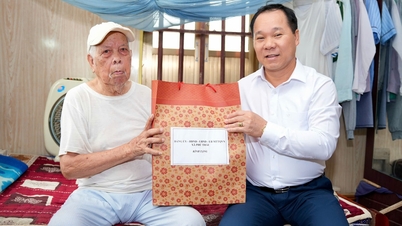



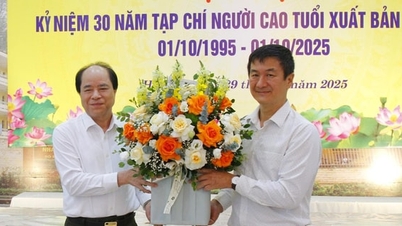

























































































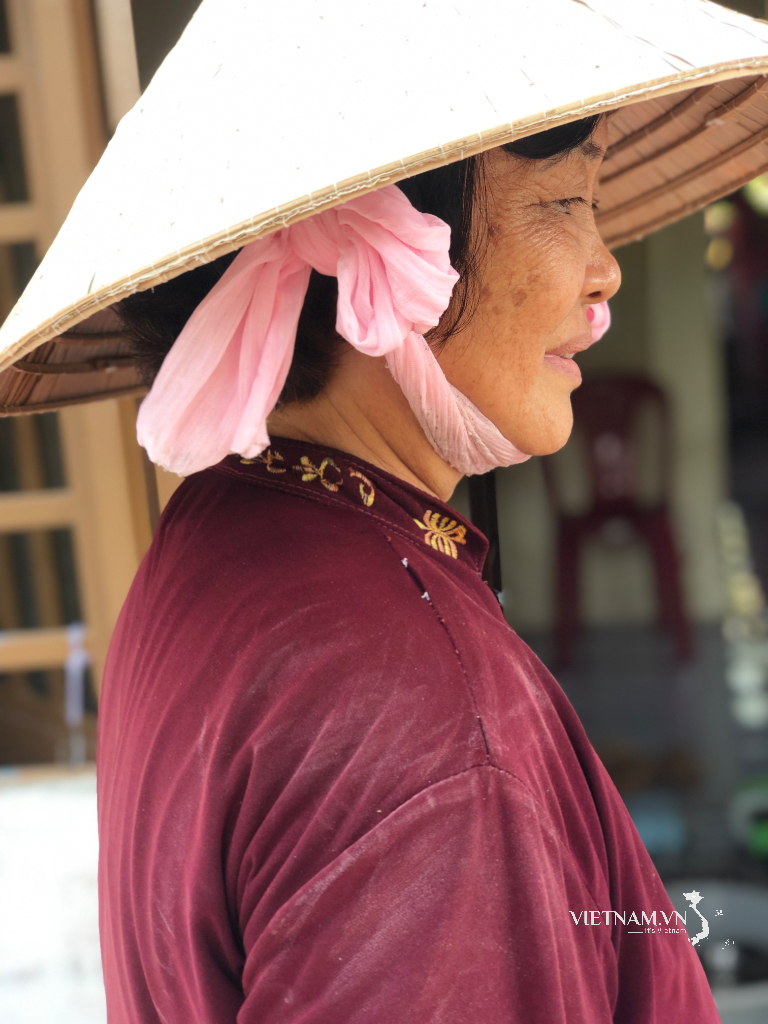

Comment (0)